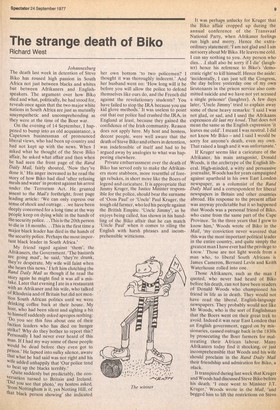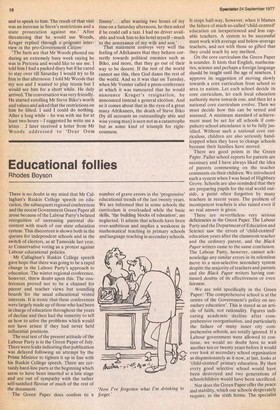The strange death of Biko
Richard West
Johannesburg The death last week in detention of Steve Biko has roused high passion in South Africa not just between blacks and whites but between Afrikaners and Englishspeakers. The argument over how Biko died and what, politically, he had stood for, reveals once again that the two major white nations in South Africa are just as mutually unsympathetic and uncomprehending as they were at the time of the Boer war.
On the evening of 14 September, I happened to bump into an old acquaintance, a Capetown businessman of pronounced liberal views, who had been up country and had not kept up with the news. When I asked what he thought of the Steve Biko affair, he asked what affair and then when he had seen the front page of the Rand Daily Mail, fairly shouted, 'Now they've done it.' His anger increased as he read the story of how Biko had died 'after refusing meals and water' in protest against his arrest under the Terrorism Act. He grunted assent to the Mail's forthright, front page leading article: 'We can only express our sense of shock and outrage. . .we have been deeply concerned for a long time at the way people keep on dying while in the hands of the security police. ...This is the 20th person to die in 18 months. . .This is the first time a major black leader has died in the hands of the security police. Perhaps the most important black leader in South Africa.'
My friend raged against 'them', the Afrikaners, the Government. 'The bastards are going mad', he said, 'they're drunk, they're desperate. My wife will faint when she hears this news.' I left him clutching the Rand Daily Mail as though if he read the story again he might find it was all a mistake. Later that evening I ate in a restaurant With an Afrikaner and his wife, who talked of Rhodesia and of Britain but did not mention South African politics until we were drinking coffee back at their house. My host, who had been silent and sighing a bit to himself suddenly asked apropos nothing: `Do you see this fuss about one of their faction leaders who has died on hunger strike? Why do they bother to report this? Personally I had never ever heard of this man. If I had my way some of these people would be dead before they even got to prison.' He lapsed into sulky silence, aware that what be had said was not right and his wife added unhappily that 'Our police tend to beat up the blacks terribly.' Quite suddenly but predictably, the conversation turned to Britain and Ireland. `Did you see that photo,' my hostess asked, from Nottingham is it, yes Notting Hill, of that black person showing' she indicated her own bottom `to two policemen? I thought it was thoroughly indecent.' And her husband went on: 'How long will it be before you will allow the police to defend themselves like ours do, and the French did against the revolutionary students? You have failed to stop the IRA because you use kid glove methods.' It was useless to point out that our police had crushed the IRA, in England at least, because they gained the confidence of the Irish community. Reason does not apply here. My host and hostess, decent people, were well aware that the death of Steve Biko and others in detention, was indefensible of itself and had to be argued away by analogies to what was happening elsewhere.
Private embarrassment over the death of Biko has served only to make the Afrikaners more stubborn, more resentful of foreign rebukes, in short more like the Boers of legend and caricature. It is appropriate that Jimmy Kruger, the Justice Minister responsible for the police, should bear the surname of 'Oom Paul' or 'Uncle' Paul Kruger, the tough old farmer, who led his people against the British Empire. 'Uncle Jimmy', as he enjoys being called, has shown in his handling of the Biko affair that he can match 'Uncle Paul' when it comes to riling the English with harsh phrases and incomprehensible witticisms. It was perhaps unlucky for Kruger. that the Biko affair cropped up during the annual conference of the Transvaal National Party, when Afrikaner feelings run high and merry. Hence the extraordinary statement: 'I am not glad and I am not sorry about Mr Biko. He leaves me cold. I can say nothing to you. Any person who dies. . .I shall also be sorry if I die' (laughter) hence his reference to Biko's 'democratic right' to kill himself. Hence the aside: 'incidentally, I can just tell the Congress, the day before yesterday one of my own lieutenants in the prison service also com mitted suicide and we have not yet accused a single prisoner' (laughter). A few days later, 'Uncle Jimmy' tried to explain away some of these heavy remarks: 'I said I was not glad, or sad, and I used the Afrikaans expression dit laat my koud. That does not mean the same as the English expression 'it leaves me cold'. I meant I was neutral. I did not know Mr Biko — and I said I would be sorry for anyone's death, even my own. That raised a laugh and it was unfortunate.' If Kruger seems like a caricature of the Afrikaner, his main antagonist, Donald Woods, is the archetype of the English lib eral. High-minded, a witty and persuasive journalist, Woods has for years campaigned against apartheid in his own East London newspaper, as a columnist of the Rand Daily Mail and a correspondent for liberal newspapers in Britain and other countries abroad. His response to the present affair ' was anyway predictable but it so happened that Woods was a personal friend of Biko, who came from the same part of the Cape Province. 'In the three years that I grew to know him,' Woods wrote of Biko in the Mail, 'my conviction never wavered that this was the most important political leader in the entire country, and quite simply the greatest man I have ever had the privilege to know.' Those are not light words from a man who, to liberal South Africans is James Cameron, Bernard Levin and Keith Waterhouse rolled into one.
Those Afrikaners, such as the man I quoted, who never had heard of Biko before his death, can not have been readers of Donald Woods who championed his friend in life as in death. They would not have read the liberal, English-language newspapers. They probably would not like Mr Woods, who is the sort of Englishman that the Boers went on their great trek to avoid. Indeed it was near East London that an English government, egged on by missionaries, caused outrage back in the 1830s by prosecuting the Boer farmers for maltreating their African labour. Many Afrikaners today find it shocking, or just incomprehensible that Woods and his wife should proclaim in the Rand Daily Mail their friendship and admiration for Biko, a nlack.
It transpired during last week that Kruger and Woods had discussed Steve Biko before his death. 'I once went to Minister J.T. Kruger,' Woods wrote in the Mail, 'and begged him to lift the restrictions on Steve and to speak to him. The result of that visit was an increase in Steve's restrictions and a state prosecution against me.' After threatening that he would sue Woods, Kruger replied through a poignant interview in the pro-Government Citizen: 'The facts are that Mr Woods phoned me during an extremely busy week saying he was in Pretoria and would like to see me. I told him I had a packed diary but if he cared to stay over till Saturday I would try to fit him in that afternoon. I told Mr Woods that my son and I wanted to play tennis but I would see him for a short while. He duly arrived. The conversation was very friendly. He started extolling Mr Steve Biko's worth and values and asked that the restrictions on him be lifted. I said I could do nothing. After a long while — he was with me for at least two hours — I suggested he write me a letter.. later received a letter from Mr Woods addressed to 'Dear Oom Jimmy'. . after wasting two hours of my time on a Saturday afternoon, he then asked if he could call a taxi. I had no driver available and took him to his hotel myself —much to the annoyance of my wife and son.' That statement conveys very well the feeling of Afrikaners that they behave correctly towards political enemies such as Biko, and more, that they go out of their way to be decent. If the rest of the world cannot see this, then God damn the rest of the world. And so it was that on Tuesday, when Mr Vorster called a press-conference at which it was rumoured that he would announce Kruger's resignation, he announced instead a general election. And so it comes about that in the eyes of a great many Afrikaners, the death of Steve Biko (by all accounts an outstandingly able and wise young man) is seen not as a catastrophe but as some kind of triumph for righteousness.



































 Previous page
Previous page